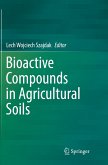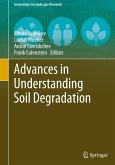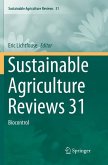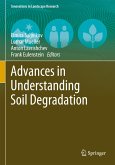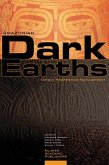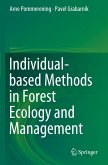Cultural Understanding of Soils
The importance of cultural diversity and of the inner world
Herausgegeben:Patzel, Nikola; Grunwald, Sabine; Brevik, Eric C.; Feller, Christian
Cultural Understanding of Soils
The importance of cultural diversity and of the inner world
Herausgegeben:Patzel, Nikola; Grunwald, Sabine; Brevik, Eric C.; Feller, Christian
- Gebundenes Buch
- Merkliste
- Auf die Merkliste
- Bewerten Bewerten
- Teilen
- Produkt teilen
- Produkterinnerung
- Produkterinnerung
Cultural understandings of soil are diverse and often ambiguous. Cultural framing of soils is common worldwide and is highly consequential. The implications of what place the earth has in people's world view and everyday life can be in line with or in conflict with natural conditions, with scientific views, or with agricultural practices. The main assumption underlying this work is that soil is inescapably perceived in a cultural context by any human. This gives emergence to different significant webs of meaning influenced by religious, spiritual, or secular myths, and by a wide range of…mehr
Andere Kunden interessierten sich auch für
![Cultural Understanding of Soils Cultural Understanding of Soils]() Cultural Understanding of Soils117,99 €
Cultural Understanding of Soils117,99 €![Bioactive Compounds in Agricultural Soils Bioactive Compounds in Agricultural Soils]() Bioactive Compounds in Agricultural Soils110,99 €
Bioactive Compounds in Agricultural Soils110,99 €![Advances in Understanding Soil Degradation Advances in Understanding Soil Degradation]() Advances in Understanding Soil Degradation205,99 €
Advances in Understanding Soil Degradation205,99 €![Sustainable Agriculture Reviews 31 Sustainable Agriculture Reviews 31]() Sustainable Agriculture Reviews 31110,99 €
Sustainable Agriculture Reviews 31110,99 €![Advances in Understanding Soil Degradation Advances in Understanding Soil Degradation]() Advances in Understanding Soil Degradation147,99 €
Advances in Understanding Soil Degradation147,99 €![Amazonian Dark Earths Amazonian Dark Earths]() Amazonian Dark Earths241,99 €
Amazonian Dark Earths241,99 €![Individual-based Methods in Forest Ecology and Management Individual-based Methods in Forest Ecology and Management]() Arne PommereningIndividual-based Methods in Forest Ecology and Management59,99 €
Arne PommereningIndividual-based Methods in Forest Ecology and Management59,99 €-
-
-
Cultural understandings of soil are diverse and often ambiguous. Cultural framing of soils is common worldwide and is highly consequential. The implications of what place the earth has in people's world view and everyday life can be in line with or in conflict with natural conditions, with scientific views, or with agricultural practices. The main assumption underlying this work is that soil is inescapably perceived in a cultural context by any human. This gives emergence to different significant webs of meaning influenced by religious, spiritual, or secular myths, and by a wide range of beliefs, values and ideas that people hold in all societies. These patterns and their dynamics inform the human-soil relationship and how soils are cared for, protected, or degraded.
Therefore, there is need to deal inter-culturally with different sources and types of knowledge and experience regarding soil; a need to cultivate soil awareness and situationally appropriate care through inter- andintra-cultural dialogues and learning. This project focuses on the human and intangible dimensions of soil.
To serve this aim, the International Union of Soil Sciences (IUSS) founded a working group on Cultural Patterns of Soil Understanding that has resulted in this book, which presents studies from almost all continents, written by soil scientists and experts from other disciplines. A major objective of this project is to promote intercultural literacy that gives readers the opportunity to appreciate soil across disciplinary and cultural boundaries in an increasingly globalized world. . .
Therefore, there is need to deal inter-culturally with different sources and types of knowledge and experience regarding soil; a need to cultivate soil awareness and situationally appropriate care through inter- andintra-cultural dialogues and learning. This project focuses on the human and intangible dimensions of soil.
To serve this aim, the International Union of Soil Sciences (IUSS) founded a working group on Cultural Patterns of Soil Understanding that has resulted in this book, which presents studies from almost all continents, written by soil scientists and experts from other disciplines. A major objective of this project is to promote intercultural literacy that gives readers the opportunity to appreciate soil across disciplinary and cultural boundaries in an increasingly globalized world. . .
Produktdetails
- Produktdetails
- Verlag: Springer / Springer International Publishing / Springer, Berlin
- Artikelnr. des Verlages: 978-3-031-13168-4
- 2023
- Seitenzahl: 564
- Erscheinungstermin: 23. September 2023
- Englisch
- Abmessung: 241mm x 160mm x 36mm
- Gewicht: 1004g
- ISBN-13: 9783031131684
- ISBN-10: 3031131681
- Artikelnr.: 64280510
- Herstellerkennzeichnung Die Herstellerinformationen sind derzeit nicht verfügbar.
- Verlag: Springer / Springer International Publishing / Springer, Berlin
- Artikelnr. des Verlages: 978-3-031-13168-4
- 2023
- Seitenzahl: 564
- Erscheinungstermin: 23. September 2023
- Englisch
- Abmessung: 241mm x 160mm x 36mm
- Gewicht: 1004g
- ISBN-13: 9783031131684
- ISBN-10: 3031131681
- Artikelnr.: 64280510
- Herstellerkennzeichnung Die Herstellerinformationen sind derzeit nicht verfügbar.
Dr. Nikola Patzel got degrees in environmental science, depth psychology, and received his doctorate in 2002 at the ETH Zurich (Switzerland) for research on "Soil Science and the Unconscious". After 10 years of research on that, he published in 2015 a book on "Symbols in Agriculture". He works in research and consulting on nature relationships and soil communication, and gives courses on soil for farmers, which integrate scientific, cultural, and psychological aspects. Patzel chairs the working group on "Cultural Patterns of Soil Understanding" in the International Union of Soil Sciences (IUSS) and is head of Commission VIII "Soil in Education and Society" at the German Soil Science Society (DBG). Dr. Eric Brevik is the Dean of the College of Agricultural, Life, and Physical Sciences at Southern Illinois University Carbondale. He has also taught courses in geology and soil science at Dickinson State University (DSU) and Valdosta State University, coordinated the DSU Environmental Science degree program, and advised student research. Dr. Brevik's research interests include combining information from soil science and geology, soil genesis, and the impact of humans on soil properties and processes, as well as soil science history, education, and links between soil science and culture. He is an active member of the European Geoscience Union, International Union of Soil Sciences, and Soil Science Society of America. Dr. Sabine Grunwald earned a Ph.D. in Environmental Sciences from Giessen University, Germany and is Professor in the Soil, Water and Ecosystem Science Department at the University of Florida (UF), Gainesville, Florida, USA. She has research expertise in soil-ecosystem modeling, AI machine learning and deep learning, soil carbon quantification and modeling, pedometrics, digital soil mapping, soil health, soil proximal sensing and remote sensing, environmental quality assessment, and geospatial analysis. She has published over 213 peer-reviewed publications, is a highly cited researcher, and is actively engaged in the national and global soil science community. She also earned a Ph.D. in Integral and Transpersonal Psychology from the California Institute of Integral Studies, San Francisco, CA. Dr. Grunwald has served as the Director of the University of Florida Mindfulness Program since 2015 and teaches mindfulness meditation sessions and workshops. She is also a trained Embodied Life Coach providing services in ontological coaching to foster wellness, health and wellbeing and connect people to nature and the environment. Dr. Christian Feller is an Emeritus Soil Scientist and the former Director of Research at the "Institut de Recherche pour le Développement" (IRD) in Montpellier, France. He earned his MS (1969) and PhD degrees in organic chemistry (1972) from the Sorbonne University (Faculty of Sciences) in Paris, and his Doctorate of Science (1994) in Soil Science from the Louis Pasteur University in Strasbourg. His research focuses on soil organic matter studies applied to soil fertility and environmental services-in particular, the impact of agroecological practices on soil-plant carbon sequestration in tropical and subtropical areas; he has worked extensively in Senegal, French West Indies (Martinique), Brazil, and most recently, Madagascar. Christian is a member of the French Academy of Agriculture, and was the first recipient of the Soil Science Society of America's Nyle C. Brady Frontiers of Soil Science Lectureship in 2006. He served as Chair (2014¿2018) of the Division 4 on The Role of Soils in Sustaining Society and the Environment of the International Union of Soil Sciences.
A. Introduction to Cultural Soil Dimensions.- 1. Which soil and which cultural approach? All editors, in preparation.- B. World Cultures: Religious, Spiritual and Other Worldviews on Soils.- 2. Cultural patterns of soil cultivation in Europe (3 parts) Nikola Patzel. Chapters in revision.- 2.1 Polytheistic context.- 2.2 Monotheistic context.- 2.3 Scientific context, and organic notions.- 3. Soil in the shamanism mythology and rituals in Northern Eurasia Pavel Krasilnikov. Completed.- 4. From Native American tradition to modern day America, Native origin legends that involve soil and Earth Jeffrey Homburg, Sabine Grunwald, and Eric Brevik. (Sample chapter available below).- 5. The Dogon: The creation of consciousness through agriculture Eva Wertenschlag-Birkhäuser. Completed.- 6. The Yoruba pedosphere: The tale of Onilé Guilherme Sobrinho and Nilton Silva. In revision.- 7. Importance of soil in Islam, a study based on statements in the Quran Mohsen Makki and Jérôme Juilleret. In revision.- 8. Soil in Rumi's thoughts Seyed Kazem Alavipanah, Jafar Jafarzadeh, and Kolsoum Ghazanfari. In revision.- 9. Cultural understanding of soil in China Sylvia Xiaorui Wen. Completed.- 10. Cultural understanding of soil from a Japanese perspective Hideaki Hirai and Katsuyuki Minami. Completed.- 11. Ecosattvas and Ecodharma - Modern Buddhist perspectives of soil and the environment Sabine Grunwald. Completed.- 12.Technosol cultures: New cultural understandings of urban soils Germain Meulemans. Completed.- C. Politics on Soil.- 13. Sacred soil, divine labor: Economic theology and the agrarian political in Eastern India Milinda Banerjee. In revision.- 14. A deity we belong to or a property to own? Land & people relations in Buryat communities of the Sayan mountains Tatiana Intigrinova. Completed.- D. Case Studies on the Inner Soil of Individual Scientists.- 15. The salt of the earth": Bernard Palissy (1510-1590) between soil science and religion Christian Feller, Jean-Paul Aeschlimann, and Nikola Patzel. Chapter in revision.- 16. Darwin and the earthworm: From God the father to mother earth Christian Feller, Laurence Feller Giraud, and Nikola Patzel. Chapter in revision.- E. Conceptual approaches and ethical perspectives.- 17. Inner and Outer soil. Nikola Patzel. In revision.- 18. Soil care: From intention to action Anna Krzywoszynska. Chapter completed.- 19. Soil care, culture and eco-identities Sabine Grunwald and Kay R. Kastner-Wilcox. Completed.- 20. Take care of soils: Toward a pluralistic integral soil ethics Sabine Grunwald. Completed.- F. Soil Education and Cultural Language of the Soil.- 21. Roots of soil perceptions by university and secondary school's students in Minas Gerais, Brazil Cristine C. Muggler, Arthur S. Gasparini and Débora C.L. dos Santos. Chapter in revision.- 22. Degrees pursued by students in different countries to train for careers in soil science Eric C. Brevik, Damien Field, Jacqueline Hannam, Maja Krzic, Rainer Horn, Cristine Muggler, Jude Odhiambo, Yoshitaka Uchida, Danny Itkin, Hong-sheng Wu, Liana Pozza, Laura Bertha Reyes Sánchez, and Thomas Scholten. Chapter completed.- 23. Proverbs on soils Jay E. Yang, H.S. Kim, P. Borrelli and M.B. Kirkham. Chapter completed.- G. Concluding Remarks and Outlook.- 24. Conclusions Nikola Patzel, Eric Brevik, Sabine Grunwald, and Christian Feller. Chapter in preparation.
A. Introduction to Cultural Soil Dimensions.- 1. Which soil and which cultural approach? All editors, in preparation.- B. World Cultures: Religious, Spiritual and Other Worldviews on Soils.- 2. Cultural patterns of soil cultivation in Europe (3 parts) Nikola Patzel. Chapters in revision.- 2.1 Polytheistic context.- 2.2 Monotheistic context.- 2.3 Scientific context, and organic notions.- 3. Soil in the shamanism mythology and rituals in Northern Eurasia Pavel Krasilnikov. Completed.- 4. From Native American tradition to modern day America, Native origin legends that involve soil and Earth Jeffrey Homburg, Sabine Grunwald, and Eric Brevik. (Sample chapter available below).- 5. The Dogon: The creation of consciousness through agriculture Eva Wertenschlag-Birkhäuser. Completed.- 6. The Yoruba pedosphere: The tale of Onilé Guilherme Sobrinho and Nilton Silva. In revision.- 7. Importance of soil in Islam, a study based on statements in the Quran Mohsen Makki and Jérôme Juilleret. In revision.- 8. Soil in Rumi's thoughts Seyed Kazem Alavipanah, Jafar Jafarzadeh, and Kolsoum Ghazanfari. In revision.- 9. Cultural understanding of soil in China Sylvia Xiaorui Wen. Completed.- 10. Cultural understanding of soil from a Japanese perspective Hideaki Hirai and Katsuyuki Minami. Completed.- 11. Ecosattvas and Ecodharma - Modern Buddhist perspectives of soil and the environment Sabine Grunwald. Completed.- 12.Technosol cultures: New cultural understandings of urban soils Germain Meulemans. Completed.- C. Politics on Soil.- 13. Sacred soil, divine labor: Economic theology and the agrarian political in Eastern India Milinda Banerjee. In revision.- 14. A deity we belong to or a property to own? Land & people relations in Buryat communities of the Sayan mountains Tatiana Intigrinova. Completed.- D. Case Studies on the Inner Soil of Individual Scientists.- 15. The salt of the earth": Bernard Palissy (1510-1590) between soil science and religion Christian Feller, Jean-Paul Aeschlimann, and Nikola Patzel. Chapter in revision.- 16. Darwin and the earthworm: From God the father to mother earth Christian Feller, Laurence Feller Giraud, and Nikola Patzel. Chapter in revision.- E. Conceptual approaches and ethical perspectives.- 17. Inner and Outer soil. Nikola Patzel. In revision.- 18. Soil care: From intention to action Anna Krzywoszynska. Chapter completed.- 19. Soil care, culture and eco-identities Sabine Grunwald and Kay R. Kastner-Wilcox. Completed.- 20. Take care of soils: Toward a pluralistic integral soil ethics Sabine Grunwald. Completed.- F. Soil Education and Cultural Language of the Soil.- 21. Roots of soil perceptions by university and secondary school's students in Minas Gerais, Brazil Cristine C. Muggler, Arthur S. Gasparini and Débora C.L. dos Santos. Chapter in revision.- 22. Degrees pursued by students in different countries to train for careers in soil science Eric C. Brevik, Damien Field, Jacqueline Hannam, Maja Krzic, Rainer Horn, Cristine Muggler, Jude Odhiambo, Yoshitaka Uchida, Danny Itkin, Hong-sheng Wu, Liana Pozza, Laura Bertha Reyes Sánchez, and Thomas Scholten. Chapter completed.- 23. Proverbs on soils Jay E. Yang, H.S. Kim, P. Borrelli and M.B. Kirkham. Chapter completed.- G. Concluding Remarks and Outlook.- 24. Conclusions Nikola Patzel, Eric Brevik, Sabine Grunwald, and Christian Feller. Chapter in preparation.



